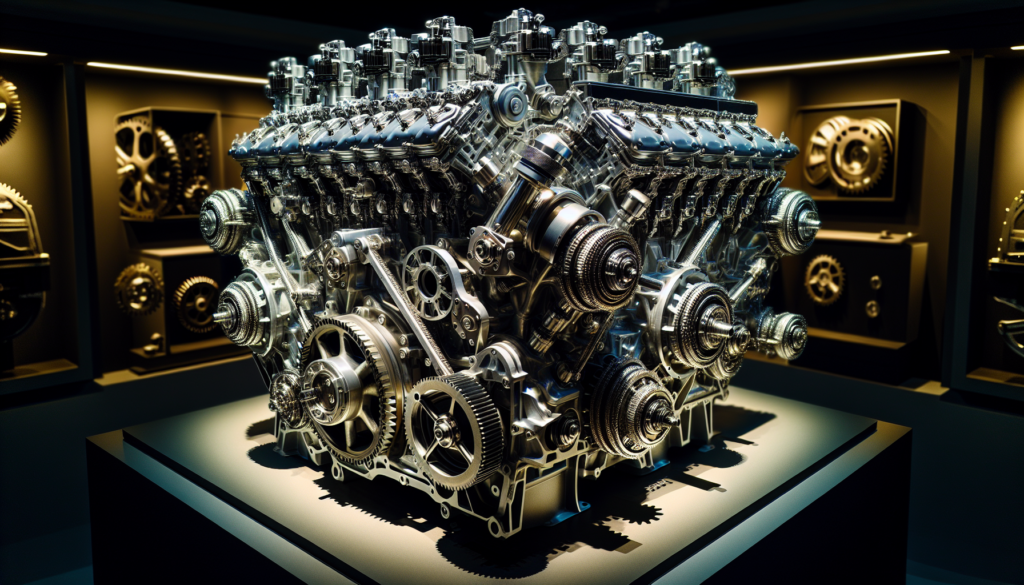Are you thinking about customizing your boat engine? If so, there are several important factors that you should consider before diving in. From horsepower and fuel efficiency to maintenance and warranty, making the right choices can greatly enhance your boating experience. In this article, we will explore the key factors that you should keep in mind when customizing your boat engine, helping you make informed decisions that will ensure optimal performance and enjoyment on the water.

Choosing the right engine type
Gasoline engines
When it comes to choosing the right engine type for your boat, gasoline engines are a popular choice. These engines are known for their reliability, ease of maintenance, and wide availability of spare parts. Gasoline engines are also relatively affordable compared to other options, making them a cost-effective choice for many boat owners. However, it’s important to consider the fuel consumption of gasoline engines, as they tend to burn more fuel than diesel engines.
Diesel engines
If fuel efficiency and longevity are important factors for you, then diesel engines might be the right choice for your boat. Diesel engines are known for their superior fuel efficiency, allowing you to go longer distances without needing to refuel. Additionally, diesel engines are built to withstand heavy use and are often more durable than gasoline engines. However, diesel engines do come with a higher initial purchase cost and can be more expensive to maintain.
Outboard engines
Outboard engines are a popular choice for small to medium-sized boats. These engines are mounted on the exterior of the boat, making them easily accessible for repairs and maintenance. Outboard engines are also versatile and can be easily maneuvered, making them a great option for recreational boaters and anglers. However, it’s important to note that outboard engines may not provide the same level of power and performance as inboard engines.
Inboard engines
Inboard engines are typically found on larger boats and yachts. These engines are mounted inside the boat, making them less accessible for repairs and maintenance compared to outboard engines. However, inboard engines offer increased power and torque, allowing you to tow larger objects and navigate rough waters more easily. Inboard engines also tend to be quieter and provide better stability compared to outboard engines. However, it’s important to consider the higher installation and maintenance costs associated with inboard engines.
Understanding horsepower requirements
Boat weight and size
When choosing an engine for your boat, it’s important to consider the weight and size of your vessel. Larger and heavier boats require engines with more horsepower to provide adequate power and performance. On the other hand, smaller boats may not need as much horsepower and can benefit from more fuel-efficient engines. It’s important to find the right balance between horsepower and fuel efficiency to ensure optimal performance.
Intended use
The intended use of your boat is another crucial factor to consider when determining the horsepower requirements. If you plan on using your boat for fishing or leisurely cruising, a lower horsepower engine may be sufficient. However, if you’re looking to engage in water sports or need the power to navigate through rough waters, a higher horsepower engine would be more suitable. Consider your specific needs and the activities you’ll be engaging in with your boat to determine the right horsepower.
Number of passengers
The number of passengers you typically have on board can also impact the horsepower requirements. More passengers mean more weight, which can affect the performance of your boat. If you regularly have a large number of passengers on board, you may need to choose an engine with higher horsepower to compensate for the added weight and ensure optimal performance.
Desired speed
The desired speed at which you want your boat to travel is another important factor to consider when determining the horsepower requirements. If you’re looking for a boat that can reach high speeds, you’ll need an engine with higher horsepower. However, if you prefer a more leisurely cruising speed, a lower horsepower engine may be sufficient. Consider your desired speed and the type of performance you’re looking for when choosing the right horsepower for your boat.

Fuel efficiency considerations
Fuel consumption
Fuel consumption is an important consideration, especially for those who spend a lot of time on the water. Gasoline engines tend to have higher fuel consumption compared to diesel engines, so if fuel efficiency is a priority for you, diesel engines may be a better choice. It’s important to calculate the estimated fuel consumption based on your expected usage to ensure you choose an engine that meets your needs without breaking the bank.
Cruising speed
The cruising speed at which you typically travel can also impact fuel efficiency. If you prefer to cruise at higher speeds, you may consume more fuel compared to cruising at lower speeds. It’s important to find a balance between speed and fuel efficiency to optimize your boating experience. Consider the maximum cruising speed you’re comfortable with and choose an engine that offers a good balance between speed and fuel economy.
Driving style
Your driving style can also impact the fuel efficiency of your boat engine. Optimal fuel efficiency is achieved by maintaining a steady speed and avoiding sudden accelerations and decelerations. By adopting a more relaxed and smooth driving style, you can maximize fuel efficiency and reduce your overall fuel consumption. Consider your driving habits and choose an engine that can accommodate your preferred style while still offering adequate power.
Environmental impact
Emission regulations
Emission regulations are an important consideration when choosing a boat engine, especially in areas with strict environmental regulations. It’s important to ensure that the engine you choose meets all the necessary emission standards to comply with local regulations. Many newer engines are designed to be more environmentally friendly, reducing harmful emissions and minimizing their impact on the environment.
Eco-friendly options
If environmental sustainability is a priority for you, there are eco-friendly options available in the market. Some engines are designed with advanced technologies to minimize fuel consumption and reduce emissions. These engines often incorporate features like catalytic converters and improved combustion processes to achieve higher fuel efficiency and lower emissions. Consider these eco-friendly options if minimizing your environmental impact is important to you.
Noise pollution
Noise pollution is another environmental consideration to keep in mind. While it may not be a direct environmental impact, excessive noise from boat engines can disrupt marine life and disturb other boaters. If noise pollution is a concern, look for engines that are designed with noise reduction features. Many modern engines incorporate sound-deadening materials and advanced technologies to minimize noise output, allowing for a quieter and more enjoyable boating experience.

Maintenance and serviceability
Access for repairs
When choosing a boat engine, it’s important to consider the ease of access for repairs and maintenance. Outboard engines are generally easier to access and service compared to inboard engines. With outboard engines, you can easily lift them out of the water for repairs or maintenance, reducing the need for costly dry-docking. Inboard engines, on the other hand, require more effort and time for servicing due to their location within the boat.
Ease of maintenance
Apart from access for repairs, the overall ease of maintenance should also be considered. Some engines may require more frequent maintenance, while others are designed to be low-maintenance. Factors like oil changes, spark plug replacements, and other routine maintenance tasks should be taken into account. Consider your own mechanical skills and available resources when choosing an engine that aligns with your maintenance capabilities.
Availability of spare parts
Another important aspect of maintenance is the availability of spare parts. It’s important to choose an engine for which spare parts are readily available. Engines from reputable manufacturers usually have a wide network of dealers and suppliers, ensuring that you can easily find any necessary spare parts. On the other hand, engines from lesser-known brands may have limited availability of spare parts, making maintenance and repairs more challenging.
Warranty and customer support
The warranty and customer support offered by the engine manufacturer is also an important consideration. A comprehensive warranty can provide peace of mind, knowing that any potential issues will be covered within the specified period. In addition, good customer support ensures that any questions or concerns you may have can be addressed promptly and efficiently. Prioritize engines from manufacturers with a strong reputation for excellent warranty terms and customer support.
Compatibility and integration
Boat design and layout
The design and layout of your boat play a significant role in determining the compatibility and integration of your chosen engine. Different boats have different structural requirements and limitations, and not all engines may be suitable for every boat design. Consider the specific dimensions and layout of your boat and choose an engine that is compatible with the existing space and design restrictions.
Control systems
The control systems of your boat, such as steering and throttle controls, need to be compatible with the chosen engine. Ensure that the engine you select can integrate smoothly with the existing control systems of your boat or be prepared to make any necessary modifications or upgrades. Smooth integration between the engine and control systems is essential for ensuring optimal performance and ease of operation.
Instrumentation compatibility
In addition to control systems, the instrumentation compatibility should also be considered. Modern boat engines often come with advanced digital displays and instrumentation that provide valuable information about the engine’s performance and diagnostics. Ensure that the chosen engine is compatible with the existing instrumentation or be prepared to upgrade to a compatible system to fully utilize the features and benefits offered by the engine.
Fuel and electrical systems
The compatibility of the fuel and electrical systems with the chosen engine is crucial for a smooth and reliable operation. Ensure that the chosen engine is compatible with the fuel type available in your area and that the existing fuel system meets the engine’s requirements. Additionally, verify that the electrical system can handle the power demands of the chosen engine, especially if you’re upgrading to a more powerful engine.

Budget and cost considerations
Initial purchase cost
The initial purchase cost of the engine is an important factor to consider, especially if you’re working within a specific budget. Gasoline engines generally have a lower initial purchase cost compared to diesel engines, making them a more affordable choice for many boat owners. However, it’s important to also consider the long-term operating costs to determine the overall cost-effectiveness of the chosen engine.
Installation expenses
In addition to the engine cost, installation expenses should also be taken into account. Some engines may require additional modifications or upgrades to ensure proper integration with your boat. Consider the potential installation expenses and factor them into your overall budget when selecting a boat engine.
Long-term operating costs
Long-term operating costs, including fuel consumption and maintenance expenses, should be carefully considered. While a certain engine may have a lower initial purchase price, it may come with higher fuel consumption or maintenance costs in the long run. It’s important to assess the overall cost-effectiveness of the chosen engine by taking into account the projected fuel consumption and maintenance requirements over the expected lifespan of the engine.
Power and performance requirements
Torque and acceleration
The torque and acceleration capabilities of the engine are important factors to consider, especially if you engage in water sports or require quick acceleration. Engines with higher torque can provide better acceleration and towing capacity, ensuring that you can navigate through strong currents or tow water skiers or wakeboarders comfortably. Consider your specific power and performance requirements and choose an engine that can deliver the necessary torque and acceleration.
Towing capacity
If you plan on using your boat for towing purposes, it’s important to choose an engine with sufficient towing capacity. Engines with higher horsepower and torque are typically better suited for towing larger objects. Consider the maximum towing capacity you’re likely to require and choose an engine that can handle the expected load without straining or compromising its performance.
Thrust
The thrust of the engine affects its ability to move the boat through the water efficiently. Higher thrust engines are typically more powerful and can propel larger boats more effectively. Consider the size and weight of your boat and choose an engine with adequate thrust to ensure smooth and efficient propulsion.
Reliability
Reliability is a key factor to consider when choosing a boat engine. You want an engine that you can depend on, knowing that it will start reliably and perform consistently. Engines from reputable manufacturers with a proven track record of reliability and durability are often the safest choice. Additionally, reading customer reviews and seeking recommendations from other boat owners can provide valuable insights into the reliability of different engine models.

Resale value
Brand reputation
The brand reputation of the engine manufacturer can have a significant impact on the resale value of your boat. Engines from reputable brands with a strong track record of quality and reliability tend to hold their value better in the used boat market. Consider engines from well-established manufacturers that have a positive reputation among boating enthusiasts to maximize the resale value of your boat in the future.
Engine popularity
The popularity of a particular engine model can also influence its resale value. Engines that are widely used and well-regarded within the boating community often attract more potential buyers and can command a higher resale price. Consider popular engine models that have a strong following to increase the likelihood of a successful resale if you plan on upgrading or selling your boat in the future.
Market demand
The overall market demand for a specific engine type can also affect its resale value. Engines that are in high demand and have a limited supply can often fetch a higher price on the resale market. Consider the current market trends and demand for different engine types to assess the potential resale value and marketability of your boat in the future.
Manufacturer reputation and support
Reliability and durability
The reputation of the engine manufacturer for reliability and durability is an important consideration. Engines from reputable manufacturers with a history of producing high-quality and long-lasting products are generally a safer choice. Look for engines from manufacturers that have a strong reputation for durable and reliable engines to minimize the risk of unexpected breakdowns and costly repairs.
Technical support
The availability of technical support from the engine manufacturer is crucial for long-term peace of mind. In the event of any technical issues or questions, having reliable technical support can make a significant difference. Engines from manufacturers with a robust support system and a network of authorized service centers ensure that any potential issues can be addressed promptly and efficiently.
Warranty terms
The warranty terms offered by the engine manufacturer are also an important consideration. A comprehensive warranty provides protection against any potential defects or issues that may arise within the specified period. Longer warranty durations and generous coverage can be indicators of the manufacturer’s confidence in their product’s quality and reliability. Prioritize engines that come with a strong warranty to provide added security and peace of mind.

